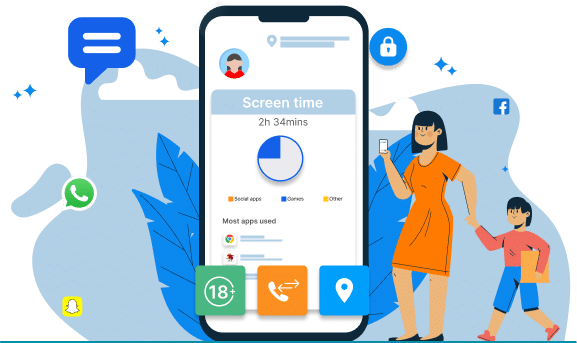
It seems like AI voice cloning scams went from being science fiction to being a real threat very quickly. Criminals can now make a parent’s or child’s voice from just a few seconds of online audio thanks to cheap, open-source AI. A scared teen might hear, “Mom, I’m hurt—send money!” while a parent might hear a fake cry saying that their child has been taken.
These incredibly realistic scams get around caller ID and take advantage of people’s natural desire to protect themselves. This article discusses the risk, emphasizes protection from scams, and demonstrates how TiSPY’s Call Tracker enables alert parents worldwide to remain cool, check, and act right now.
What Are AI Voice Cloning Scams and How They Work
Deep-learning models that map tone, rhythm, and breathing are used in AI voice cloning scams to make speech copies that are impossible to tell apart from the original. Fraudsters take voice clips from rants on YouTube, duets on TikTok, podcast talks, game chats, and even short voicemail greetings. Today’s tools can make a living copy in ten seconds or less, and cloud APIs send it immediately.
The bad guy writes down a panic call after cloning the voice. They might call a kid and say they are a parent in need of help immediately, or they could call the parent and say their child is “hurt” and needs money. Callers often use fake voices, so people act without thinking. This is precisely what con artists want.
Why Children and Teens Are Easy Targets

For young ears, emotional anxiety is strong. Teenagers tend to trust people they know and don’t know how to spot phone phishing scams. Scammers take advantage of this by pretending to be in immediate danger, losing their wallets, or having hospital bills. They then demand that you act right away. Teenagers skip second-factor checks, share information, or wire money because the person “sounds right,” becoming a victim of an online scam without realizing it.
Criminals can make copies of podcast clips, game chat chatter, and short movies all the time because people share them all the time. Teenagers, on the other hand, value quick responses over verifications that show loyalty or wisdom. These things make them perfect marks for well-timed, compelling arguments.
Real-Life Incidents and Global Rise of Voice Scams

There are a lot more reports of AI voice cloning scams. The U.S. Federal Trade Commission (FTC) says that fake voice imposter scams cost the country $2.7 billion in 2023. Starling Bank research in the UK found that cloned-voice scammers called 28% of people at least once last year.
The police in Indore, India, reported a kidnap scam in which a mother paid after hearing the cloned sobs of her daughter. Every week, similar things happen in Australia, Canada, and South Africa, showing that the threat is spreading worldwide and worsening. Law enforcement warns that plummeting computer costs will make the trend worse.
How TiSPY Call Tracking Helps Detect and Prevent Voice Scams
Visibility is power when time is of the essence. Parents can protect against phishing calls and offer protection from scams with TiSPY:
- Dashboard for Call Tracker: A list of all the calls made on your child’s phone right now, with the time and length of each call.
- Alerts for Caller ID and Frequency: Alerts you to calls from strange numbers or the same suspicious person who keeps calling.
- Recording and Storing Audio in the Cloud: Review talks and find gaps that sound robotic or background sounds that don’t go with the conversation.
- Similarities in SMS, WhatsApp, and Social Logs: Link texts to calls to show how pressure methods are changing.
- Instant Remote Controls: You can end a call, turn off data, or block the number from anywhere.
TiSPY gives families valuable minutes to check out stories, get help, and stop con artists by making smartphones an early warning monitor. It adds another layer of protection that crooks don’t expect.
Parental Safety Tips to Stay Ahead of Voice Scams
Tech helps, but habits put up the wall to protect against phishing:
- Kids should know that they should never give out money or data while on the phone—they should hang up and then call a known number.
- Create a family “safe word” that you keep secret and change it often in case of an actual emergency.
- You can set up a weekly review of the logs and auto-block strange callers who call you more than once with TiSPY’s call tracking.
- Tell kids to take a moment to breathe and text their parents directly before giving in to an urgent request.
By doing these drills, you can boost confidence, improve the ability to think critically, and protect yourself from even the most advanced AI voice cloning scams.
Conclusion
Artificial sounds exploit real feelings, yet there is something parents can do about them. AI voice cloning scams are getting more frequent, yet free communication and understanding, and such clever applications as TiSPY will make a difference. Institute checking-call rituals and train children to relax before they panic.
With several levels of digital security and family collaboration, any parent can keep one step ahead. They can ensure that every call and loved one stays genuine today, no matter where they are in the world.




